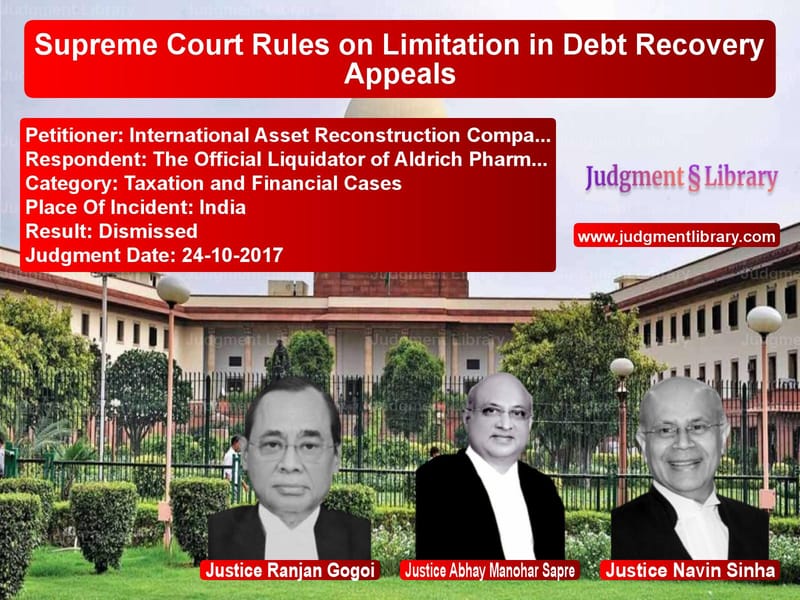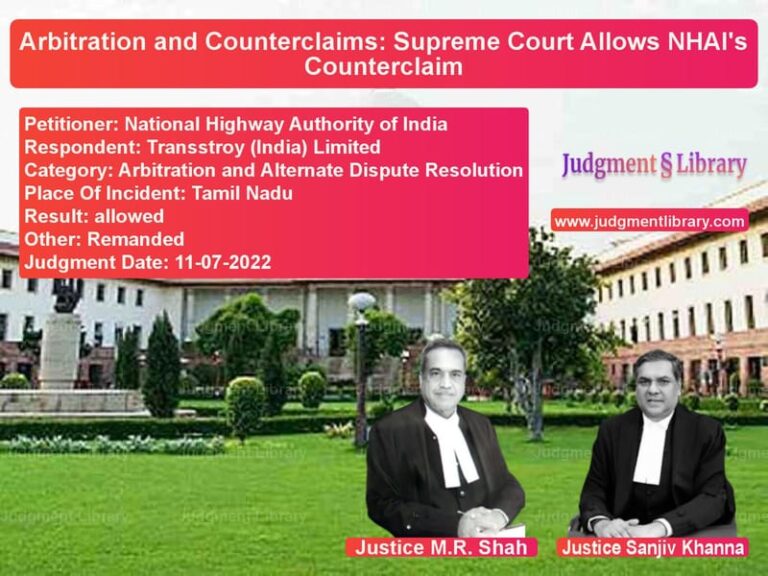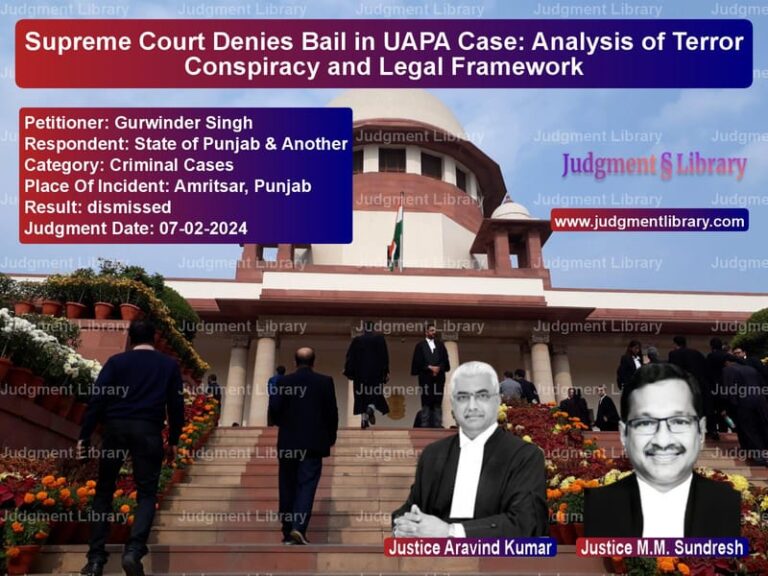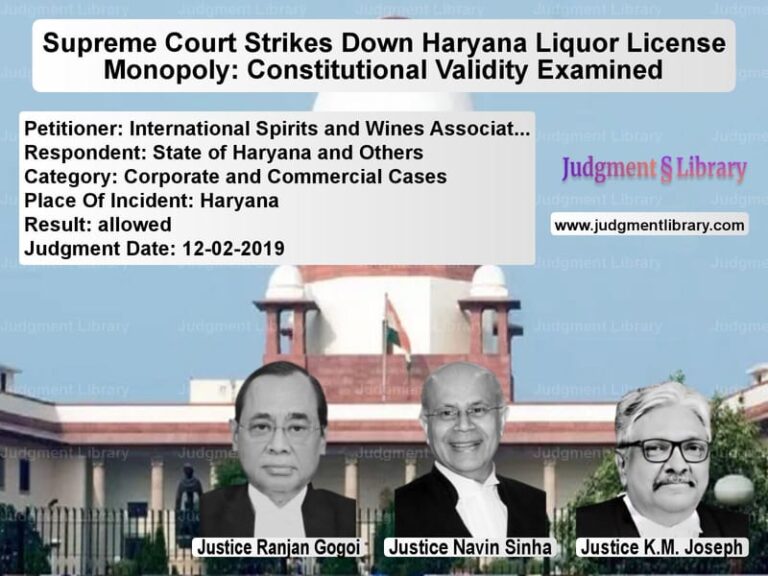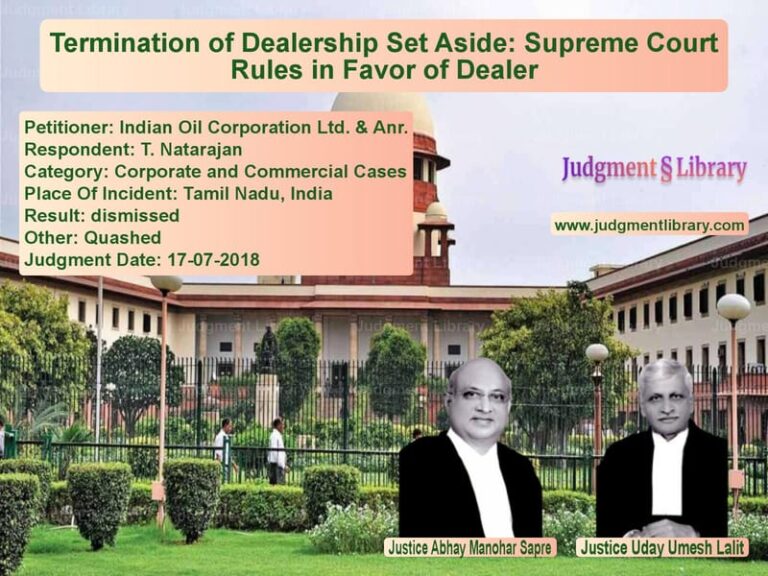Supreme Court Rules on Limitation in Debt Recovery Appeals
The Supreme Court of India delivered a landmark ruling in International Asset Reconstruction Company of India Ltd. vs. The Official Liquidator of Aldrich Pharmaceuticals Ltd. and Iridium India Telecom Ltd. vs. Doha Bank QSC, clarifying the applicability of Section 5 of the Limitation Act, 1963, to appeals filed under Section 30(1) of the Recovery of Debts and Bankruptcy Act, 1993 (RDB Act).
The issue before the Court was whether the delay in filing an appeal beyond the prescribed period of 30 days under Section 30(1) of the RDB Act could be condoned by invoking Section 5 of the Limitation Act.
Background of the Case
The cases arose from appeals against orders of the Recovery Officer, which were filed beyond the 30-day limitation period under the RDB Act. The appellants contended that the provisions of the Limitation Act should be applicable, allowing the condonation of delay, while the respondents argued that the RDB Act was a complete code in itself, and the Legislature had intentionally excluded any provision for extension of time.
Both cases revolved around a fundamental question of law: whether Section 5 of the Limitation Act applied to appeals under Section 30(1) of the RDB Act.
Legal Issues
- Whether the RDB Act was a complete code in itself, excluding the applicability of Section 5 of the Limitation Act.
- Whether the 30-day limitation period under Section 30(1) of the RDB Act was absolute and could not be extended.
- Whether the principles of natural justice required the condonation of delay in debt recovery appeals.
Arguments of the Petitioners
The petitioners, represented by senior advocate Madhavi Divan, argued that:
- The RDB Act was not a complete code and did not expressly exclude the Limitation Act.
- Section 29(2) of the Limitation Act allowed for the application of Section 5 to appeals under the RDB Act.
- Since the tribunal was not bound by the Code of Civil Procedure and was guided by principles of natural justice, it had the discretion to condone delay.
- Similar provisions in other laws permitted condonation of delay, and the RDB Act should be interpreted in a similar manner.
Arguments of the Respondents
The respondents, represented by senior advocate Arvind P. Datar, countered that:
- The RDB Act was a special law enacted to expedite the recovery of debts, and its strict timelines must be adhered to.
- The 30-day limitation period under Section 30(1) was intended to be final, and the Legislature had deliberately not provided for an extension.
- Section 24 of the RDB Act, which applied the Limitation Act to certain proceedings, was limited to original applications under Section 19 and did not extend to appeals under Section 30(1).
- The Supreme Court had previously ruled that tribunals were not courts, and unless expressly stated, the Limitation Act would not apply to them.
Supreme Court’s Observations
The Supreme Court examined the scheme of the RDB Act, the intent of the Legislature, and prior judicial precedents. The key observations of the Court were:
- The RDB Act is a special law enacted to facilitate and expedite the recovery of debts due to banks and financial institutions through a statutory tribunal.
- Section 18 of the Act bars the jurisdiction of any civil court or authority, indicating the Legislature’s intent to create a self-contained mechanism.
- The Act specifically provides for condonation of delay in Section 20(3), which applies to appeals before the appellate tribunal, but no such provision exists for appeals under Section 30(1).
- Section 24 of the RDB Act makes the Limitation Act applicable only to original applications under Section 19 and does not extend to appeals under Section 30(1).
- The amendment of Section 30 in 2000, which removed the deeming provision that equated orders of the Recovery Officer with those of the Tribunal, further indicated the Legislature’s intent to keep the 30-day limitation period strict.
The Court cited Sakuru vs. Tanaji (1985), which held that the Limitation Act applies only to proceedings before courts and not to tribunals unless expressly provided. It concluded that the 30-day limitation period under Section 30(1) of the RDB Act was absolute and could not be extended.
Final Judgment
The Supreme Court ruled:
- The RDB Act is a complete code in itself, and Section 5 of the Limitation Act does not apply to appeals under Section 30(1).
- The 30-day limitation period under Section 30(1) is mandatory and cannot be extended.
- Allowing condonation of delay would defeat the purpose of the RDB Act, which is to ensure the speedy recovery of debts.
- The appeals were dismissed, and the orders of the lower tribunals refusing to condone delay were upheld.
Conclusion
This judgment reaffirms the principle that special laws enacted for specific purposes must be strictly interpreted. The ruling has significant implications for debt recovery proceedings, as it reinforces the need for financial institutions and borrowers to adhere to prescribed timelines.
The decision ensures that debt recovery proceedings remain expeditious, fulfilling the objective of the RDB Act. It also sets a precedent for other tribunals, confirming that the Limitation Act applies only where expressly provided by statute.
Don’t miss out on the full details! Download the complete judgment in PDF format below and gain valuable insights instantly!
Download Judgment: International Asset vs The Official Liquida Supreme Court of India Judgment Dated 24-10-2017.pdf
Direct Downlaod Judgment: Direct downlaod this Judgment
See all petitions in Banking Regulations
See all petitions in Debt Recovery
See all petitions in Legal Malpractice
See all petitions in Judgment by Ranjan Gogoi
See all petitions in Judgment by Abhay Manohar Sapre
See all petitions in Judgment by Navin Sinha
See all petitions in dismissed
See all petitions in supreme court of India judgments October 2017
See all petitions in 2017 judgments
See all posts in Taxation and Financial Cases Category
See all allowed petitions in Taxation and Financial Cases Category
See all Dismissed petitions in Taxation and Financial Cases Category
See all partially allowed petitions in Taxation and Financial Cases Category

